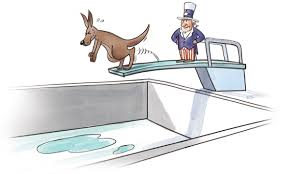
Australia’s China-bashing self-hurting
By Chen Hong – Global Times
Australian Ambassador to Washington Arthur Sinodinos made an outrageous intimidation to Beijing in a recent webinar with Harvard University’s Kennedy School. Sinodinos said that Australia was ready to stand up to China, noting that Canberra has “demonstrated a preparedness – at least to date – to wear” economic costs to contest and confront Beijing.
This entirely unprovoked latest threat was made against the background of the bilateral relationship between Australia and China being ceaselessly poisoned and exacerbated by the anti-China crusade – something that Canberra is doing to support Washington’s global efforts to contain, suppress and crush China’s peaceful development.
Sinodinos seems to understand that such unwarranted acts of open hostility will naturally incur the rightful irritation and anger from Beijing. And as if anticipating some possible consequences, he indicated that Canberra was bracing for “a bumpy time for a while.”
China has been defiantly opposing the malevolent smear campaign launched by Australia’s Liberal-National Coalition government since mid-2017. The smear campaign has damaged the previously positive and constructive partnership. It has fallen to the historically lowest ebb since the two countries established diplomatic relationship in 1972.
While China never uses economic means as leverage for political purposes, Canberra has over and over again ideologically antagonized China. This has alienated and discouraged Chinese businesses, investors and the general public. It has brought adverse impacts to the mutually beneficial political, economic, social and cultural exchanges between the two countries.
Sinodinos tried to guilefully rationalize Canberra’s constant impairment to its relationship with Beijing, while preposterously accusing China of infringing on Australia’s sovereignty.
It is Canberra that has been irresponsibly politicizing and weaponizing economic activities by imposing reckless bans and arbitrary restrictions on Chinese business proposals and investments. On the other hand, Sinodinos and his ilk blame China for being a bully. Such deceptiveness is Machiavellian in nature, and typifies the Morrison administration’s acts of disinformation to mislead the Australian public as well as the world in their perceptions of China and its policies.
Sinodinos is a perfect example of Canberra’s increasingly assertive and aggressive diplomatic stance. This especially resonates with the hawkish anti-China sect, a group of right wing parliamentarians who have been painstakingly attacking China.
Since he was appointed Australian ambassador to the US early this year, Sinodinos has been tirelessly championing Western countries, especially the Five Eyes and other “like-minded countries”, to align and “push back” against China. He openly preaches for an alliance among Australia, the US and other Western nations that have “a common interest in battling” China. Such belligerent rhetoric is only reminiscent of the Cold War speeches trundled out by Trump’s China hawks, such as Mike Pompeo and Peter Navarro.
Sinodinos’ remarks were not impulsive, but methodically designed in essence. From economic contests to decoupling with China, he proceeded to make spiteful attacks against the Confucius Institutes in Australia.
He made implicit condemnations in an attempt to politicize the cultural institution, which has been promoting bilateral cultural understanding and friendship.Once again, we hear the resonance to Pompeo’s malicious bid to disparage the ruling party of China in his vain attempts to distance the Chinese people from the Party.
Diplomats are supposed to be positive peace makers, rather than malevolent warmongers. Instead of safeguarding Australia’s own national interest, Sinodinos seems to be more dedicated to serving the Trump administration’s agenda in its all out crusade against China.
Further damages to the productive cooperation and exchange between the two countries will be disastrously detrimental to the mutual benefits yielded by the comprehensive strategic partnership. There is no fundamental conflict between China and Australia.
Canberra needs to remember that Australia would have much more to lose if it is determined to be an enemy of Beijing.
The author is a professor and director of the Australian Studies Centre, East China Normal University.
